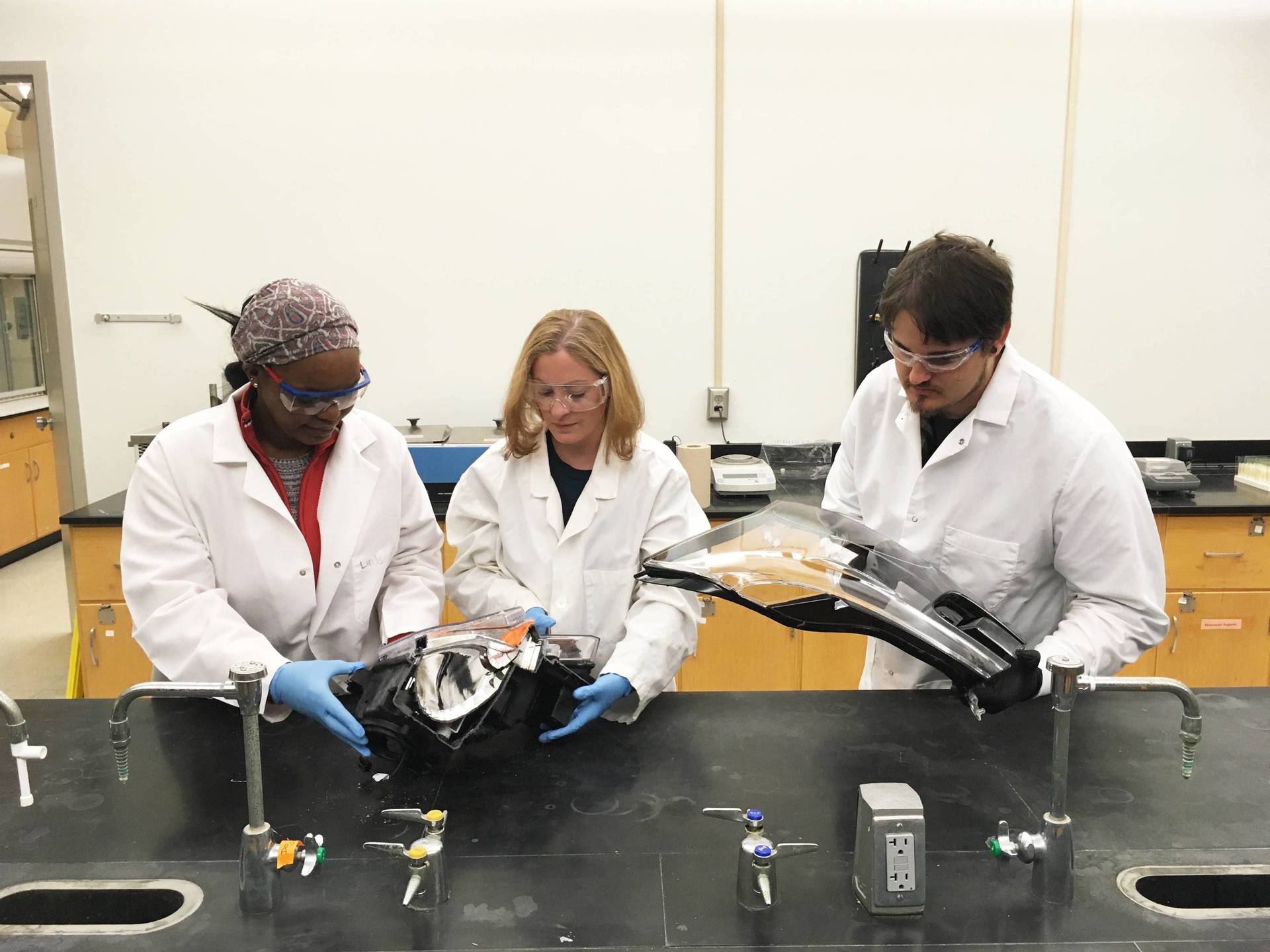

BGSU Chemistry Department, Firelands team up to solve industrial company's problems
Students are using their newly learned expertise to gain real-world experiences
By Meredith Troxel
With the help of faculty from both the Bowling Green and Huron campuses, Bowling Green State University students who attend both campuses are receiving hands-on experience with a local industrial company.
Students enrolled in organic spectroscopy in the Chemistry Department in the College of Arts and Sciences at Bowling Green and lean manufacturing at BGSU Firelands have come together to solve issues that local manufacturers have with their products and processes.
Along with their peers and their professors, Dr. Joseph Furgal and Dr. Michelle Brodke, students are using their newly learned expertise to gain real-world experiences. The collaboration between campuses started when Brodke of Firelands reached out to Furgal to discuss a client’s defect in regards to polymers, which is Furgal’s expertise.
Furgal’s organic spectroscopy class teaches undergraduate and graduate students how to determine unknown organic compounds. Students learn necessary techniques for analyzing unknown organic compounds in research and at crime scenes. Cory Sims, a BGSU graduate student studying photochemical sciences, credits the class for exposing him to the chemical field and experience as a consultant.
Brodke’s class focuses on introducing the idea of lean manufacturing and waste reduction in the manufacturing process. Students also learn how to document manufacturers’ current state, identify root causes of the waste and recommend changes for the future.
This past fall, the collaboration project was completed with the help of a local industrial client, Ventra Sandusky Plastics. Work with Ventra started halfway into the semester after students learned more about the skills necessary to complete the project.
“Anytime people with different experiences and backgrounds can be put together, new and creative things will always happen.”
Students had the opportunity to tour the plant and meet in person with company management, as well as interact with students from the opposite campus while visiting Ventra. The project was split into Bowling Green campus students and Firelands campus students working on different issues for Ventra.
“The first project focused on defect analysis on anti-haze and anti-reflection coatings for headlamps, where the coating line at some point in the process was introducing contaminants that were causing headlamp failures,” Furgal said. “The second project focused on making thermal imaging diagram correlations to determine the optimal adhesive thickness needed from a robot system to prevent product failure while also not using an excess of adhesive, which raises costs.”
Brodke said that the Firelands students helped document work station set-up issues and how defects contributed to problems in the work environment.
After the completion of the project, students presented their findings to their professors and managers from Ventra. They learned how to work in groups, make professional connections outside of the University scope and how important an outside opinion is to organization solving plant issues.
“The project provided a unique opportunity I was excited to have,” Sims said. “Initially, I was nervous about the accuracy of our results and recommendations we would make as an entity of BGSU, but as the term progressed my group and I gained the confidence we needed.”
It was important for the students to understand when one problem-solving technique has gone as far as it can.
“It also teaches them how to work with experts in a different field,” Brodke said. “A hallmark of the modern workforce is the need for experts in different disciplines to work together.”
Feedback from Ventra has been positive, and the company is thankful for the students being available and observant of their issues. Students faced challenges when management changed within Ventra and keeping everyone well informed, but this only helped them learn about effective communication.
“Our clients are always willing to do a project with us again. To me, this is the best endorsement you can have,” Brodke said. “Workers are happy to help students and are happy to see that someone cares about what they are doing.”
Thanks to a Ventures grant from BGSU’s Project Sea Change, an institutional change initiative funded by the National Science Foundation’s Division of Undergraduate Education, this program will expand in the coming year to purchase supplies and help students with travel to the industrial sites.
“I know this has opened up my willingness to be collaborative and these collaborations don’t necessarily need to be between just the Bowling Green and Huron campuses, other area colleges could also be involved,” Furgal said. “Anytime people with different experiences and backgrounds can be put together, new and creative things will always happen.”
Updated: 03/04/2020 02:20PM
